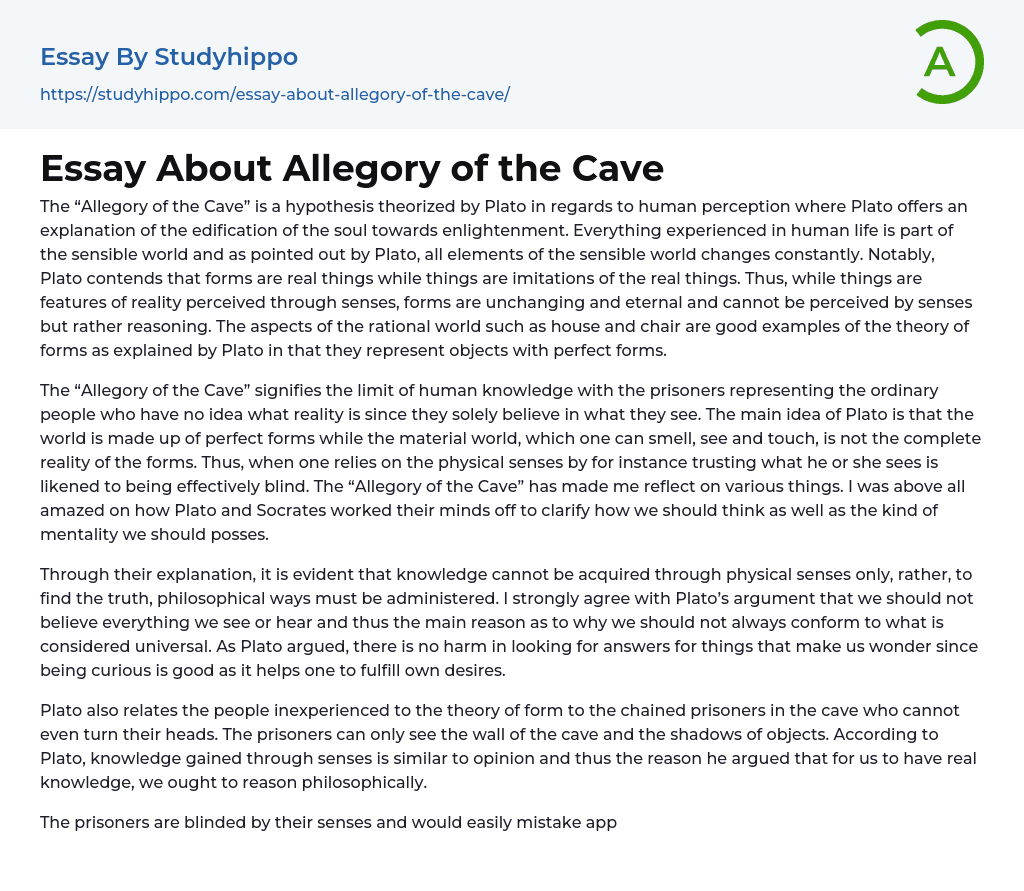The hypothesis of the "Allegory of the Cave" by Plato discusses human perception. Plato explains how the soul can be enlightened.
According to Plato, everything experienced in human life is part of the sensible world, which constantly changes. Plato argues that forms are real things, while things are mere imitations of those real things. While things can be perceived through our senses, forms are eternal and unchanging, and can only be understood through reasoning. Examples of forms in the rational world are house and chair, which represent objects with perfect forms. The "Allegory of the Cave" symbolizes the limitations of human knowledge, with the prisoners representing ordinary people who are unaware of the true nature of reality as they only rely on what they see. Plato's main idea is that the world consists of perfect forms, while the material worl
...d that we can sense through our smell, sight, and touch is not the complete reality of those forms.
In the "Allegory of the Cave," Plato and Socrates enlighten us on the importance of relying on philosophical methods to obtain knowledge. They argue that trusting solely in our physical senses can lead to blindness. This reflection has left me astounded by their intellectual efforts to guide us in our thinking and mindset. They emphasize that truth cannot be found through sensory perception alone. Instead, we must utilize philosophical approaches to uncover the truth. I strongly endorse Plato's viewpoint that we should not unquestioningly accept everything we see or hear, and thus we should not always conform to universal beliefs.
According to Plato, it is beneficial to explore and seek answers for things that arouse our curiosity. He believes that
being curious is beneficial as it allows one to fulfill their own desires. Plato also draws a comparison between inexperienced individuals and the prisoners in the cave, as both are limited in their perception. The prisoners in the cave are only able to see the wall and the shadows of objects. Plato argues that knowledge gained through the senses is akin to opinion, and therefore, he advocates for the use of philosophical reasoning in order to attain true knowledge.
The prisoners' senses blind them, causing them to mistake appearance for reality. For example, they believe the objects they see on the wall are real. In my perspective, the prisoners represent individuals in society who conform to its norms without questioning the illusory "shadows" they encounter. These shadows constitute their reality, so they see no reason to explore beyond and remain unaware of alternative ways of life. Enlightened individuals who have escaped the cave provide this false reality by understanding the true world they inhabit.
For example, the media manipulates people by presenting distorted truths in order to manipulate their thoughts and create a society where individuals are trapped like prisoners, constantly exposed to false images on TV and computers. In today's world, dominated by social media platforms that offer instant information, it becomes difficult for individuals to discern reality from illusions. Personally, I often struggle to differentiate between truth and propaganda. I agree with Plato's advice that we should be cautious in limiting ourselves and should fact-check to ensure the accuracy of the information we receive.
As a prisoner in today's society, I have the option to either keep my chains on and stay fixated on the shadows
or embrace the light and become whoever I aspire to be.
- 1984 essays
- A Farewell to Arms essays
- A Good Man Is Hard to Find essays
- A Hanging essays
- A Lesson Before Dying essays
- A Long Way Gone essays
- A Rose For Emily essays
- A Separate Peace essays
- A Tale Of Two Cities essays
- A Very Old Man With Enormous Wings essays
- Adventures Of Huckleberry Finn essays
- Alice in Wonderland essays
- All Quiet on The Western Front essays
- Allegory of the Cave essays
- An occurrence at owl creek bridge essays
- Animal Farm essays
- Anthem essays
- Antigone essays
- Arthur Conan Doyle essays
- As I Lay Dying essays
- Atticus Finch essays
- Barn Burning essays
- Battle Royal essays
- Beauty and The Beast essays
- Beloved essays
- Boo Radley essays
- Brave New World essays
- Candide essays
- Castle essays
- Characters In Hamlet essays
- Characters In Romeo And Juliet essays
- Christmas carol essays
- Chronicle of a Death Foretold essays
- Cinderella essays
- Crime and Punishment essays
- Daisy Miller essays
- Death of a Salesman American Dream essays
- Desdemona essays
- Diary Of A Wimpy Kid essays
- Dracula essays
- Dubliners essays
- Emma essays
- Ender'S Game essays
- Ethan Frome essays
- Eveline essays
- Fahrenheit 451 essays
- First-Person Narrative essays
- Fish Cheeks essays
- Frankenstein essays
- Genesis essays




